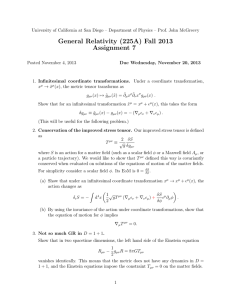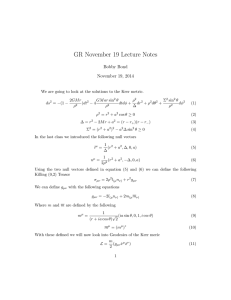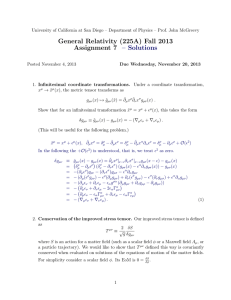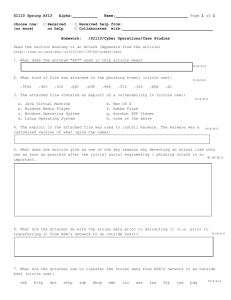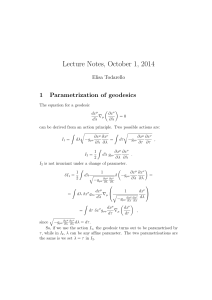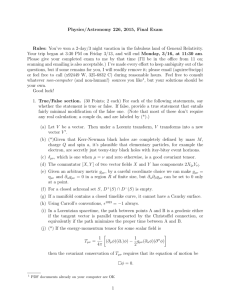History of the Indonesian equity capital markets
advertisement
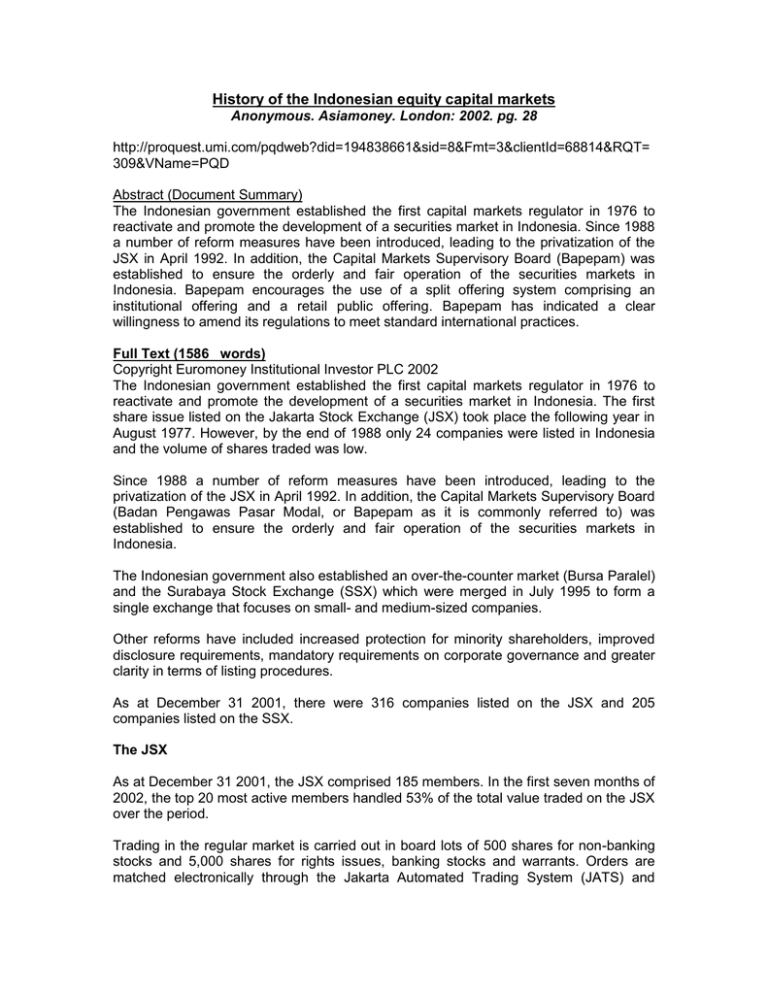
History of the Indonesian equity capital markets Anonymous. Asiamoney. London: 2002. pg. 28 http://proquest.umi.com/pqdweb?did=194838661&sid=8&Fmt=3&clientId=68814&RQT= 309&VName=PQD Abstract (Document Summary) The Indonesian government established the first capital markets regulator in 1976 to reactivate and promote the development of a securities market in Indonesia. Since 1988 a number of reform measures have been introduced, leading to the privatization of the JSX in April 1992. In addition, the Capital Markets Supervisory Board (Bapepam) was established to ensure the orderly and fair operation of the securities markets in Indonesia. Bapepam encourages the use of a split offering system comprising an institutional offering and a retail public offering. Bapepam has indicated a clear willingness to amend its regulations to meet standard international practices. Full Text (1586 words) Copyright Euromoney Institutional Investor PLC 2002 The Indonesian government established the first capital markets regulator in 1976 to reactivate and promote the development of a securities market in Indonesia. The first share issue listed on the Jakarta Stock Exchange (JSX) took place the following year in August 1977. However, by the end of 1988 only 24 companies were listed in Indonesia and the volume of shares traded was low. Since 1988 a number of reform measures have been introduced, leading to the privatization of the JSX in April 1992. In addition, the Capital Markets Supervisory Board (Badan Pengawas Pasar Modal, or Bapepam as it is commonly referred to) was established to ensure the orderly and fair operation of the securities markets in Indonesia. The Indonesian government also established an over-the-counter market (Bursa Paralel) and the Surabaya Stock Exchange (SSX) which were merged in July 1995 to form a single exchange that focuses on small- and medium-sized companies. Other reforms have included increased protection for minority shareholders, improved disclosure requirements, mandatory requirements on corporate governance and greater clarity in terms of listing procedures. As at December 31 2001, there were 316 companies listed on the JSX and 205 companies listed on the SSX. The JSX As at December 31 2001, the JSX comprised 185 members. In the first seven months of 2002, the top 20 most active members handled 53% of the total value traded on the JSX over the period. Trading in the regular market is carried out in board lots of 500 shares for non-banking stocks and 5,000 shares for rights issues, banking stocks and warrants. Orders are matched electronically through the Jakarta Automated Trading System (JATS) and settled on a T+4 basis (except for transactions in the cash market, which are settled on a T+1 basis). The following table sets out some key statistics for the JSX for the years 1997 to 2001. Scripless trading In 1997, the Indonesian government established the Indonesian Central Securities Depositary (Kustodian Sentral Efek Indonesia, or KSEI as it is commonly referred to) which operates as a central securities clearing house. In the same year, to coincide with the establishment of KSEI, Bapepam implemented regulations to provide for scripless trading. All newly listed companies are required to list their shares only in scripless form, which has considerably simplified the IPO process, as settlement is effected entirely on a delivery versus payment basis through KSEI. Most listed companies have completed the switch to scripless only trading. Foreign ownership Foreign ownership restrictions relating to listed equity securities were revoked in September 1997. As a consequence, foreign investors are permitted to purchase up to 100% of the shares offered in any public offering and up to 100% of the listed shares of all Indonesian companies. The main exception relates to banks where only 99% of the shares may be purchased by foreigners or may be publicly listed, the remainder being required to be unlisted and held by Indonesian investors. Offering procedures and the listing process Bapepam regulates and monitors all issues of equity securities which are publicly offered or listed in Indonesia. In particular, Bapepam regulates the offering and allocation procedure for IPOs. In this regard, Bapepam encourages the use of a split offering system comprising an institutional offering and a retail public offering. Bapepam is also anxious to promote the bookbuilding system to fix the price for IPOs. In terms of allocation, Bapepam has issued detailed guidelines, but in general the retail public offering must be allocated on a pooled basis, which involves a pro-rata balloting system in the event of oversubscription. The institutional offering can be allocated on either a pooled basis or; more usually, on a fixed basis where the managing underwriter (bookrunner) dictates allocations or permits each syndicate member to allocate at its own discretion. The listing process is similar to the system in the US and requires the filing of a detailed registration statement with Bapepam. Following submission, there is a 45-day review process after which, assuming all questions raised by Bapepam have been satisfactorily dealt with, the registration statement is declared effective. The public offer in Indonesia is then permitted to proceed. However, Bapepam is prepared to allow bookbuilt institutional offerings to proceed before the registration statement is declared effective, providing all offers are made subject to such declaration being issued by Bapepam. The public offering is required to remain open for a minimum of three working days. Thereafter, the managing underwriter must finalize allocations within three working days. Refunds in the event of an oversubscription in the public offering are required on the second working day after allotment and settlement normally takes place in KSEI on the same day. Listing then proceeds rapidly following settlement, and the entire process (from the commencement of the public offering to the first day of trading on the JSX) can be compressed to as little as 13 days. This represents a huge improvement on the timetable before scripless trading was introduced and results from significant efforts by Bapepam, KSEI and the JSX to speed up the IPO process so as to meet the expectations of international institutions and to minimize the market risk for investors. As with most international stock markets, listing candidates are required to meet certain historical financial requirements in order to list on the JSX. The latest rules were issued in June 2000 and set out requirements for, amongst other things, financial statements which must relate to a period ending no more than six months prior to the date on which the registration statement is declared effective. Unique features of the listing process In certain respects Bapepam's system is ahead of many other markets: directors are required to sign each document submitted to confirm its accuracy, and to initial each page, incurring personal liability for omissions and inaccurate content; all documents in final form (including signed underwriting agreements, subject only to pricing) are required to be submitted at the beginning of the registration process; Bapepam gives detailed written comments on the documents (usually within 14 days of first submission) and follows these up with a face-to-face meeting to discuss the issues and iron out any confusion; and Bapepam and the JSX operate in a seamless fashion, thereby avoiding duplication and providing clarity of approach for issuers and advisers. However, in some areas the current rules remain at odds with international practice (though both Bapepam and the JSX are currently reviewing these areas). For example: an abridged version of the registration statement is required to be published within three trading days of initial submission to Bapepam. This can lead to problems if significant revisions to the registration statement are required during the review process; extremely lengthy disclosure relating to all ownership changes since incorporation of the listing vehicle are required (with no time limit). These clutter up the registration statement with no real benefit to investors; and In considering the financial track record of the listing vehicle, only the actual rather than pro forma non-consolidated financial statements of the listing vehicle are considered. This precludes the incorporation of a new listing vehicle as part of a preIPO group reorganization unless the company is prepared to list on the development board of the JSX, rather than the main board. Changes under consideration Bapepam has indicated a clear willingness to amend its regulations to meet standard international practices. In this regard, they recently permitted the first over-allotment (or greenshoe) option for a private company (as opposed to a government privatization) as part of the IPO process. They have also permitted after-market support and stock borrowing to facilitate the over-allotment process. In addition, Bapepam has also recognized the need to speed up the secondary market offering process and is believed to be considering two alternative routes: the US-style shelf registration system; or the Hong Kong-style placing and top-up subscription system. Introduction of either of these systems would enhance the ability of existing listed companies to raise fresh equity funds through "short-fuse" offerings. Market volumes and IPOs Since the beginning of 2002, Indonesia has been one of the best performing markets in US dollar terms. Market volumes were particularly strong in the period from March to May. However, in line with global markets the Jakarta Composite Index has fallen since the middle of June and volumes have fallen with it. There have been 16 IPOs in Indonesia so far in 2002, but only two have raised more than US$10 million (US$10 million for Apexindo Pratama Duta and US$47 million for Surya Citra Media, both companies listing in July), demonstrating the limited domestic appetite for primary paper and the liquidity problems facing domestic and international institutions. There have been two large secondary market placements (US$110 million for Indosat in May and US$126 million for Telkom in July). The future Inevitably, Indonesia's equity capital markets are subject to all of the forces which affect the emerging markets. Currency volatility and political and economic forces exert huge influence on market performance and the lack of a deep pool of domestic institutional and retail funds dedicated to the equity markets creates liquidity problems which in turn restricts foreign investor appetite for all but the largest counters. That said, the Indonesian government, and in particular Bapepam and the JSX, have taken the initiative in streamlining their rules and regulations to bring them in line with international standards, steps which will ultimately pay off as Indonesia's economic recovery, 207.6 million population and huge economic potential inevitably lead to increased foreign investment over time.
